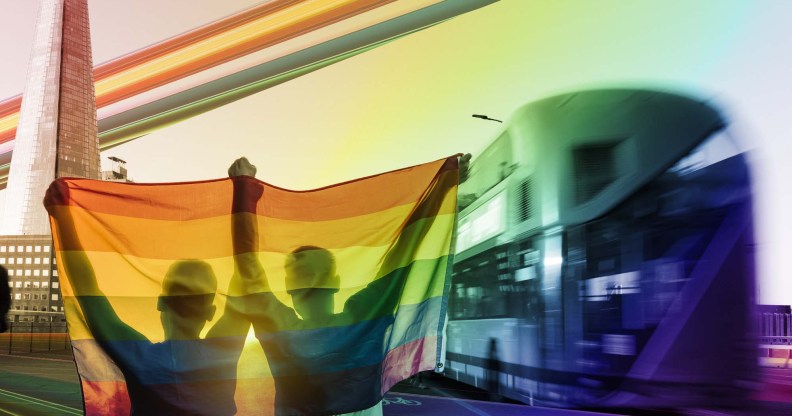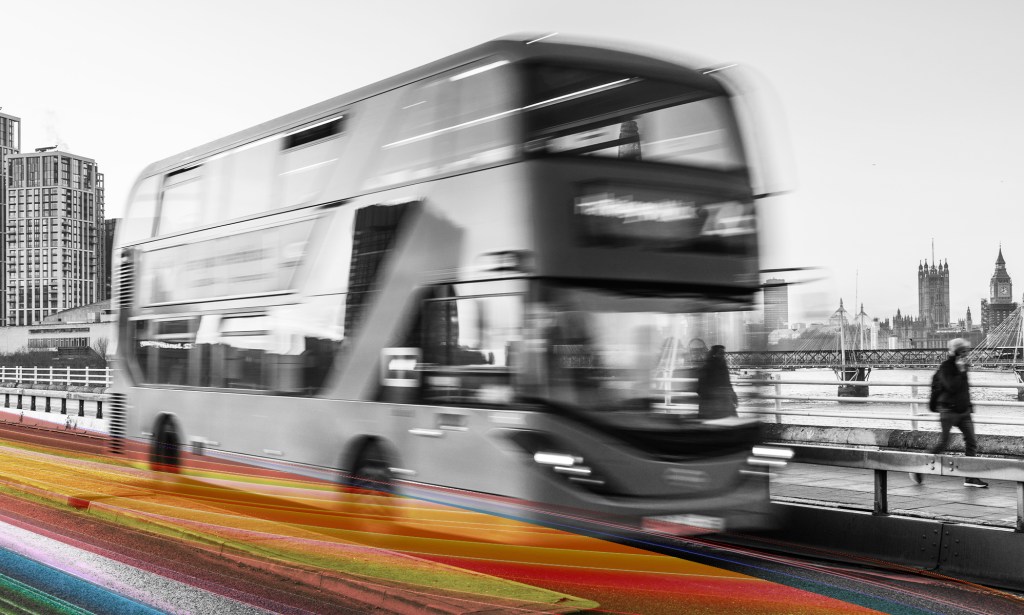Homophobic abuse victim shares vital advice for London public transport users ahead of Pride

If you witness a hate crime on Transport for London services during Pride season, there are several vital steps you can take. (PinkNews)
Pride is a time for LGBTQ+ people to be louder and prouder than ever, but sadly, sometimes that increased visibility can lead to hate being sent your way.
Over the years, I’ve learned this can happen pretty much anywhere, even when you’re just trying to get from A to B on public transport – something tens of thousands of LGBTQ+ people and allies will be doing throughout Pride month in June and during Pride in London’s iconic celebrations on 29 June.
Over a million people filled the city’s streets with a kaleidoscope of colours in 2023 to cheer on the parade and revel in Pride’s good vibes. Just a short while later, thousands of revellers descended on Queen Elizabeth Olympic Park last August to celebrate UK Black Pride – Europe’s largest Pride event for LGBTQ+ people of African, Asian, Caribbean, Latin American and Middle Eastern-descent – with festivities expected to be just as big when they kick off again later this summer.
Meanwhile, London Trans+ Pride, which will take place on 27 July, is likely to see thousands march in support of trans, non-binary, gender non-conforming and intersex lives. While this visibility and solidarity is essential, when incidents of hate do happen, it’s vital that all those people know what steps they can take to help.
I can still remember that sinking feeling when, after saying goodbye to a friend with a kiss on the cheek, a group of men realised we were gay and started shouting homophobic slurs. Nerves became distress and, soon, a whole flurry of emotions. Then came the questions: Do I move? Should I say something? What’s going to happen to me?
Another time, something similar happened in broad daylight on the top floor of a bus in Islington. My boyfriend and I were enjoying a day out in summer and, completely out of the blue, a man shouted homophobic abuse and swore at us.
Both times, I’ve wondered what I did wrong: was it the kiss on the cheek, or maybe the floral jacket I was wearing on the bus? But now, I can see clearly that there is absolutely no justification or excuse for hate crime.
If this has happened to you, I want you to know that there is nothing you did to provoke it and victims of hate crime are not responsible for it in any way. If you’ve ever witnessed a hate crime, I want you to know that there are things you can do to help.
Hate crimes are defined as a criminal offence motivated by hate and hostility towards a person because of their disability, gender identity, race, sexual orientation, religion or any other perceived difference. Crucially, it doesn’t matter if you actually belong to any of these groups – it’s about whether the perpetrator thinks you do and whether that perception is motivating their behaviour.
The second time I experienced hate crime, the driver of the bus ejected the man from the vehicle. If you experience or witness a hate crime on public transport in London – whether it’s during Pride or any other time – you should report the incident. It doesn’t matter if you’re a witness or a victim every report will be taken seriously.

Should you witness a hate crime taking place, there are several things you can do to help, depending on what is happening, the severity of the situation, who else is there and how safe and comfortable you feel.
After that man shouted at me on the bus, I was heartened by passengers who checked in on me to ask if I was OK. People might not intervene during an incident for all kinds of different reasons, particularly if the situation feels unsafe. But afterwards, showing someone kindness and making sure they don’t feel alone can make a big difference. A word of comfort to the victim – or perhaps offering to help them report it, carry on with their journey or exit the vehicle if they want to – can go a long way.
If an incident isn’t violent but a victim is clearly being made to feel uncomfortable, one thing you can do to intervene (if you feel safe doing so) is to ask the person being targeted a small question, ignoring the perpetrator. You might ask them what time it is, or what the next stop is. Sometimes, a distraction can take the heat out of a situation and break the tension, while also reminding the victim that they are not alone. And for me, feeling like I was isolated while the incident was taking place was one of the worst parts about it.
There are other things witnesses can do too. You can observe what is happening and use this information to report the incident. Take note of details, like the Tube line or bus route and where you were on the train and the route. Try to note down as much detail as possible, like what the perpetrator looks like and what they are wearing. TfL funds over 2000 dedicated police officers helping to prevent crime and antisocial behaviour, supported by 500 enforcement officers and extensive CCTV at all Tube stations.
Whether you’re seeking a conviction or not, when hate crimes are properly reported it can help to reveal the true scale of the issue and help the authorities put measures in place to prevent it. You can report an incident to the British Transport Police by texting 61016 or on the Railway Guardian App (if the incident happened on Tube or rail) or to the Met Police on met.police.uk or by calling 101 (if the incident happened on buses). Remember, if it is an emergency, call 999.
One thing I have tried to remind myself after experiencing hate crime on public transport is that, overall, it’s not a frequent part of my day-to-day experience. Out of all the Tube and bus journeys I’ve taken in the last two years, I have encountered this behaviour twice. From 2021 to 2022, there were 1,899 reports of hate crime, with up to 5 million journeys a day, on public transport. But of course, even one hate crime is one too many. Everyone deserves to feel safe — especially when travelling around the world’s most incredible city during Pride.
For more information visit TfL. Remember you can report an incident at the time it happened by texting the British Transport Police on 61016 or on the Railway Guardian App (Tube and rail) or the Met Police on met.police.uk or by calling 101 (buses).
You can also report after the event using the True Vision website.
If you’ve been affected by hate crime, there are organisations such as The Community Alliance to Combat Hate (CATCH) who can provide specialist advice, support and advocacy too.

